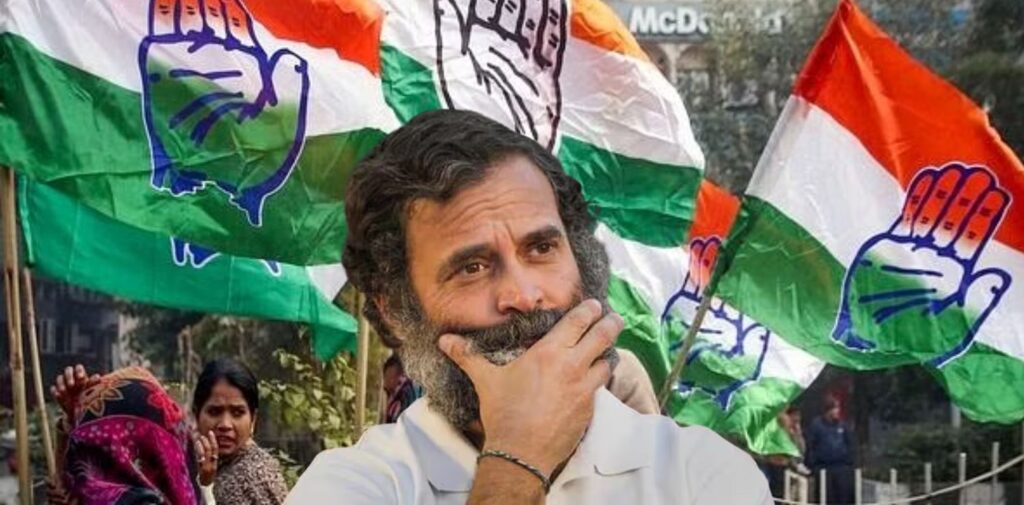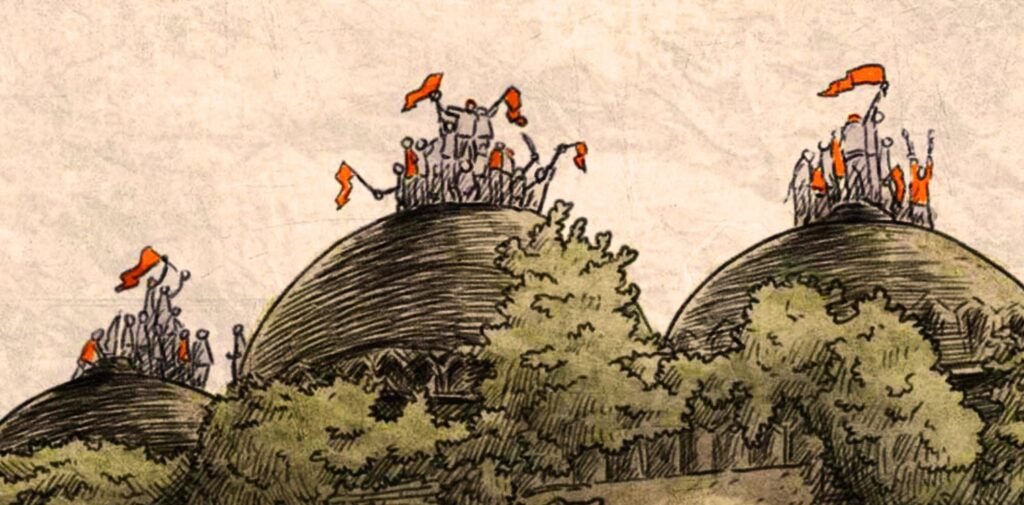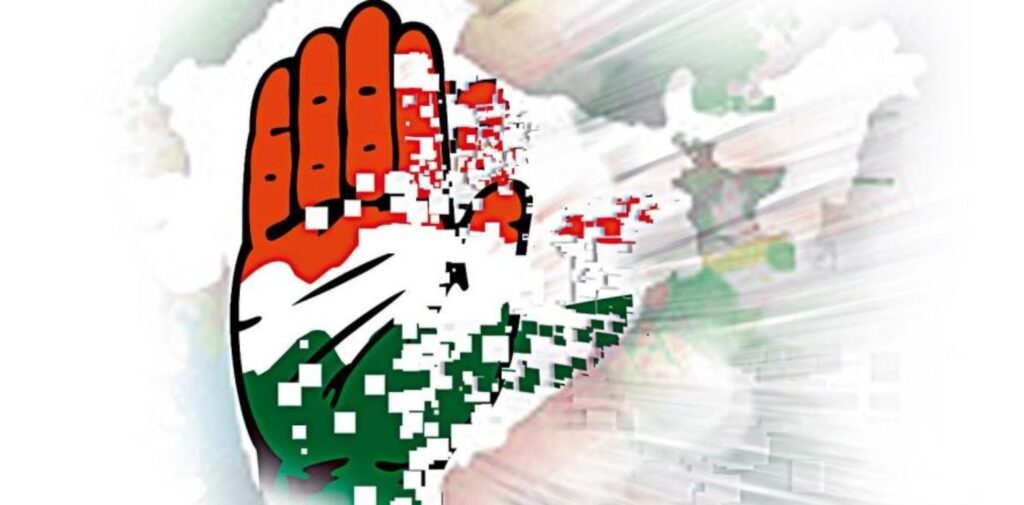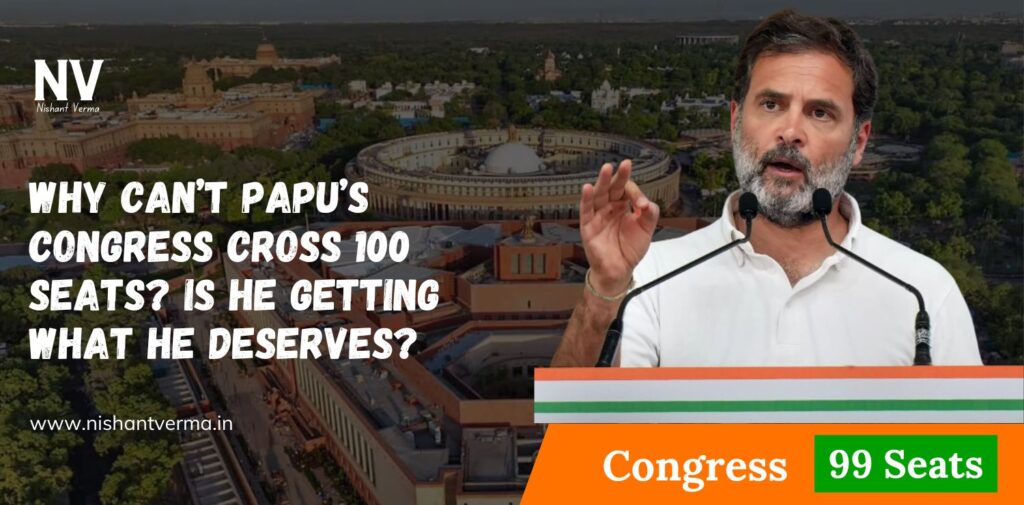Despite ruling India for over six decades, Congress is still struggling to regain its foothold, barely scraping 99 seats in recent elections. With Rahul Gandhi often mocked as “Papu” for his perceived lack of leadership, one has to ask: why does Congress continue to fall short? Is this a reflection of the party’s years of corruption, poor governance, and failed promises? Are they now simply reaping what they sowed, with India still languishing as a developing country, while they played vote bank politics and ignored true progress?
India is a nation with a rich cultural heritage, immense potential, and a vast array of resources. However, despite being one of the world’s largest democracies, it remains a developing country. While many factors contribute to this, the Congress party, which ruled the country for over 65 years, shoulders a significant portion of the blame. Having ruled the country for such a long period, one would expect that Congress would have elevated India to a global superpower by now. Instead, we see a country plagued by corruption, lack of progress, and deep-rooted problems that have not been adequately addressed.
Congress’ “Achievement”: Crossing 90 Seats – A Hollow Victory?
The Congress party is celebrating after securing 99 seats in the latest elections, a number that is indeed higher than their performance in the previous three election sessions. However, this small increase, while celebrated within the party, does not hide the bigger picture: they still haven’t been able to cross the three-digit mark, which reflects their declining relevance and inability to win the trust of the Indian populace.
In a nation with over a billion people, securing 99 seats in any election cannot be considered a substantial victory for a party that has ruled for over six decades. This modest achievement is particularly disappointing when one realizes that approximately 16% to 17% of the Congress vote base comes from the Muslim community. This highlights how Congress has relied on vote bank politics rather than working for the betterment of the nation as a whole. Congress leaders and their loyalists may take solace in the fact that they secured more seats than in the past, but it’s a hollow victory at best when juxtaposed with the long history of missed opportunities and deep-rooted corruption.

The Price of Mismanagement: A Diminishing Legacy
The Congress party’s dismal track record of governance can be traced back to its years in power following independence. While India could have emerged as a major global power due to its vast resources, immense talent pool, and strategic geographical position, the Congress party allowed the country to stagnate. This stagnation was not due to a lack of potential, but rather because Congress was more focused on self-enrichment than on serving the people.
It is no secret that corruption ran rampant during Congress’s rule. Scandals like the Bofors scam, the 2G spectrum case, and the Commonwealth Games scam paint a grim picture of the Congress leadership’s priorities. The focus seemed to be on lining their own pockets and ensuring the prosperity of their inner circles, rather than working toward the development of the nation. India’s growth was stunted as these leaders exploited their positions for personal gain, leaving the country behind in the global race for development.
India’s infrastructure, education system, healthcare, and employment opportunities all suffered as a result. While the rest of the world surged ahead with technological and industrial advancements, India remained a developing nation, struggling to catch up.
Congress’ Disrespect for Hindu Culture
One of the most controversial aspects of Congress’s reign is the way they have handled Hindu culture, which forms the very essence of India’s identity. Congress has often been accused of ignoring the sentiments of the majority Hindu population, while pandering to minorities in an attempt to secure votes. This vote bank politics has led to the alienation of the Hindu community, who feel their culture and heritage are being disrespected by a party that is supposed to represent them.
Take, for example, the Congress-led government’s handling of religious issues like the Ram Janmabhoomi-Babri Masjid case. Instead of taking decisive action that would respect the beliefs of millions of Hindus, Congress dragged its feet and prolonged the dispute for decades. This approach not only displayed a lack of respect for Hindu sentiment but also created a divide within Indian society.
Furthermore, Congress’s secularism often appears to be a thinly veiled guise for minority appeasement. By focusing on policies that benefit specific communities at the expense of the majority, Congress has undermined the unity of the nation. This pandering to vote banks has left many Hindus feeling that their culture and traditions are being sidelined in their own country.

The Return of Karma: Reaping What They Sowed
Congress is now facing the consequences of their actions. The corruption, mismanagement, and neglect of the majority population are coming back to haunt them. Their inability to cross the three-digit mark in elections is a direct reflection of the dissatisfaction felt by the Indian people. For a party that once held almost total control of the Indian political landscape, to now struggle to secure a mere 99 seats is a telling sign that their time is waning.
The Congress party’s reliance on minority votes, particularly from the Muslim community, has also backfired to some extent. While they have secured around 21% of the total vote share, with a significant portion coming from Muslims, this has not translated into widespread support across other segments of society. Instead of focusing on policies that would benefit the entire nation, Congress has pigeonholed itself into a position where it depends on vote banks to maintain relevance. This strategy has clearly failed, as evidenced by their shrinking influence.
The Indian electorate is becoming more educated and informed, and they are no longer willing to tolerate the corrupt practices of the past. Congress is now receiving what they gave the country: neglect, division, and lack of development. Their dismal performance in recent elections is simply a reflection of the people’s frustration with their mismanagement of the country for decades.

A Failing Political Machine in the New India
India has changed, and the Congress party has failed to adapt. Today’s India is not the same as the post-independence nation that Congress once ruled. The Indian people have moved on; they are seeking development, prosperity, and progress. They demand leadership that will uplift the country, create jobs, improve infrastructure, and make India a global powerhouse. Congress, meanwhile, is stuck in the past, relying on outdated strategies and corrupt practices to maintain its relevance.
In contrast, other political parties have emerged with clear visions for India’s future. They have embraced the aspirations of the Indian youth, focused on development, and championed the causes of the common man. Congress, on the other hand, continues to live off its legacy, failing to recognize that the times have changed.
The Indian people want progress, and they want leaders who can deliver that progress. Congress, with its history of corruption, pandering, and mismanagement, is no longer seen as the party that can lead India into the future. If they continue on this path, they will find themselves increasingly irrelevant in a country that is eager to move forward.
Time to Reflect and Reboot
The Congress party must take a hard look in the mirror. Their inability to cross the three-digit mark in the latest elections should serve as a wake-up call. While they may celebrate their 99 seats, the reality is that they have lost the trust of the Indian people. Their years of corruption, mismanagement, and neglect of the majority population are finally catching up with them.
If Congress is to remain relevant in Indian politics, they need to stop relying on vote bank politics and start focusing on policies that will benefit the entire nation. They need to respect the culture and heritage of the majority, while also ensuring that every Indian citizen, regardless of religion or background, has the opportunity to prosper.
India deserves better, and it is time for Congress to either step up or step aside.




